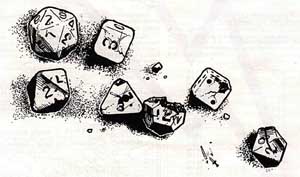By RALF TOTH
AD&D: The end of an era - The WOTC takeover of TSR (1997 - today)
On April 10, 1997 Wizards of the Coast, Inc. issued the following press release:
"WIZARDS OF THE COAST TO ACQUIRE TSR INC.
(Renton, Wash.)--Wizards of the Coast Inc. and TSR Inc., the two leaders of the adventure gaming industry,
announced today that a letter of intent has been signed by both parties for Wizards of the Coast to acquire TSR
Inc. The transaction is expected to be completed in May, 1997. "
The news exploded like a bomb. Surely there had been some rumours and TSR hadn't put out any new products for the last half year.
But in the end only upper management of both houses knew and were involved.
Wizards of the Coast (WOTC) grew from out of nowhere
through their best-selling trading card game Magic: The Gathering and was a well-known heavyweight in the gaming industry as of 1997.
Gamers all around the world asked themselves what that would mean for their beloved AD&D game.
"We look forward to drawing on TSR's worldwide reputation and established lines of popular games to complement our current business." stated Peter Adkinson, founder,
president and CEO of Wizards of the Coast.
The death of TSR Inc.
Not two months later, a second press release confirmed that the deal was closed. TSR Inc. had ceased to exist after nearly a quarter of a decade in business. Who and what had been
 responsible for that development? How could it happen that the newcomer WOTC was able to "eat" the untouchable TSR Inc.? It was Peter Adkinson who offered shocking insight on what
was going on at TSR: "It is no secret that TSR has had severe financial difficulties in recent years. TSR has operated at a loss for almost three years, and even when it was profitable
it was only barely so. If your image of TSR is that of a large, wealthy corporation swimming in money, you're in for a surprise. TSR operates on a shoestring budget with employees who barely
make a living and for the most part are working on out of date computers, with nominal funds for marketing and promotions."
On a later date, Adkinson named a number of reasons for TSR's poor financial performance:
responsible for that development? How could it happen that the newcomer WOTC was able to "eat" the untouchable TSR Inc.? It was Peter Adkinson who offered shocking insight on what
was going on at TSR: "It is no secret that TSR has had severe financial difficulties in recent years. TSR has operated at a loss for almost three years, and even when it was profitable
it was only barely so. If your image of TSR is that of a large, wealthy corporation swimming in money, you're in for a surprise. TSR operates on a shoestring budget with employees who barely
make a living and for the most part are working on out of date computers, with nominal funds for marketing and promotions."
On a later date, Adkinson named a number of reasons for TSR's poor financial performance:
- TSR's printing costs were too high as a result of an exclusive arrangement with a single printer.
- Sales returns from the book trade influenced the cash-flow.
- Overstock from old 1st edition material and Dragon Dice.
- TSR lost money on products, whose sales price was below the production costs ("We sold a ton of Encyclopedia Magicas but lost money on every copy sold because the cost of goods was so high.").
- Poor sales on several product lines (Planescape and Ravenloft had only modest sales. Birthright, Spellfire and Dragon Dice performed poorly).
- Administrative overhead (two legal departments, two accounting departments etc.)
In the winter of 1997, Adkinson had sent Ryan Dancey to TSR headquarters in Lake Geneva to evaluate the situation. Dancey wrote a report on that business trip
and published it on the internet later. What follows are excerpts from Dancey's depressing observations:
"After a hasty series of phone calls and late night strategy sessions, I found myself standing in the snow outside of 201 Sheridan Springs Road staring at a building bearing a sign that said "TSR, Incorporated".
Inside the building, I found a dead company."

"In the halls that had produced the stuff of my childhood fantasies, and had fired my imagination and become unalterably intertwined with my own sense of self, I found echoes,
empty desks, and the terrible depression of lost purpose.
 I toured a warehouse packed from floor to 50 foot ceiling with products valued as though they would soon be sold to a distributor with production stamps stretching back to the late 1980s.
I was 10 pages in to a thick green bar report of inventory, calculating the true value of the material in that warehouse when I realized that my last 100 entries had all been "$0"'s.
I read the severance agreements between the company and departed executives which paid them extraordinary sums for their silence. I noted the clauses, provisions, amendments and agreements that
were piling up more debt by the hour in the form of interest charges, fees and penalties."
I toured a warehouse packed from floor to 50 foot ceiling with products valued as though they would soon be sold to a distributor with production stamps stretching back to the late 1980s.
I was 10 pages in to a thick green bar report of inventory, calculating the true value of the material in that warehouse when I realized that my last 100 entries had all been "$0"'s.
I read the severance agreements between the company and departed executives which paid them extraordinary sums for their silence. I noted the clauses, provisions, amendments and agreements that
were piling up more debt by the hour in the form of interest charges, fees and penalties."
"In all my research into TSR's business, across all the ledgers, notebooks, computer files, and other sources of data, there was one thing I never found - one gaping hole in the mass of
data we had available. No customer profiling information. No feedback. No surveys. No "voice of the customer". TSR, it seems, knew nothing about the people who kept it alive.
The management of the company made decisions based on instinct and gut feelings; not data. They didn't know how to listen - as an institution, listening to customers was considered something that
other companies had to do - TSR lead, everyone else followed."
"I met staff members who were determined to continue to work, despite the knowledge that they might not get paid, might not even be able to get in to the building each day.
I saw people who were working on the same manuscripts they'd been working on six months earlier, never knowing if they'd actually be able to produce the fruits of their labor. In the eyes of
those people (many of whom I have come to know as friends and co workers), I saw defeat, desperation, and the certain knowledge that somehow, in some way, they had failed. The force of the human,
personal pain in that building was nearly overwhelming - on several occasions I had to retreat to a bathroom to sit and compose myself so that my own tears would not further trouble those already tortured souls."
With debts of around $30 million, Lorraine Williams had sold out to WOTC in 1997. This was welcomed by nearly everyone involved, since the alternative would have meant bankruptcy.
"That [the acquisition] is surely a step in the right direction for TSR." wrote E. Gary Gygax, the inventor of AD&D. "Lorraine Williams despised gamers, and she stated in my
presence that they were not her "social equals". She also claimed she was going to show the game industry how business should be conducted. Some lesson. Clearly, Wizards of the Coast
runs an excellent operation and under their direction TSR fans should see a major improvement."
Many of the designers and editors complained, that upper management never identified with their products. It is hard to believe, but according to John Rateliff,
"senior management actually prided themselves on the fact that they never played or even read any of our games." (A Talk With John D. Rateliff, From: montecook.com)
The consequences. The end of AD&D.
Wizards of the coast continued to release AD&D materials under the TSR logo until 1999/2000. In 2000 the so-called "3rd edition" was released, but not under the name of AD&D,
but as D&D. The rules were easier, a long-needed skill system was added and several major changes in the rules were made - most of them for the good.
Many of AD&D's inconsistencies were eradicated.
Three campaign worlds were continued: Forgotten Realms, Dragonlance and Ravenloft, other, new campaign worlds were released. Planescape and
Birthright were discontinued. Greyhawk was handed over to the RPGA and became Living Greyhawk.
The result was, that AD&D was dead and a new RPG in the tradition of Gygax' D&D and AD&D had been created.
Tome of Treasures covers this new game system in the 3rd edition section. We will open a new page of D&D history soon.
|